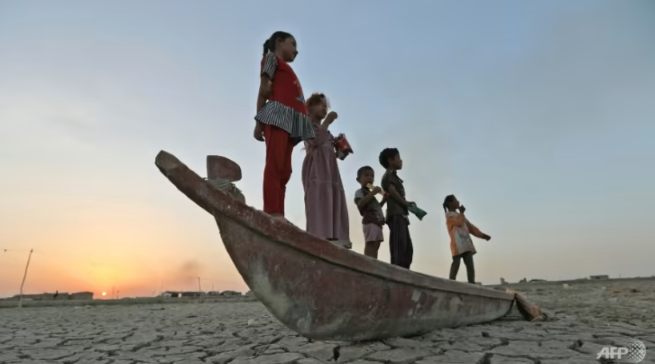May 23, 2025 | 17:35 GMT +7
May 23, 2025 | 17:35 GMT +7
Hotline: 0913.378.918
May 23, 2025 | 17:35 GMT +7
Hotline: 0913.378.918

The reputed home of the biblical Garden of Eden, Iraq's swamplands have been battered by three years of drought. Photo: AFP
"This confirms the bad news that we know already unfortunately ... (It is) clear that we need to get this warming under control in order to stop the melting of the Greenlandic ice sheet", climate physics associate professor Bo Mollesoe Vinther of the University of Copenhagen told AFP.
By drilling into the ice sheet to retrieve samples of snow and ice from hundreds of years ago, scientists were able to reconstruct temperatures from north and central Greenland from the year 1000 AD to 2011.
Their results, published in the scientific journal Nature, show that the warming registered in the decade from 2001-2011 "exceeds the range of the pre-industrial temperature variability in the past millennium with virtual certainty".
During that decade, the temperature was "on average 1.5 degrees Celsius warmer than the 20th century", the study found.
The melting of the Greenland ice sheet is already leading to rising sea levels, threatening millions of people living along coasts that could find themselves underwater in the decades or centuries to come.
Greenland's ice sheet is currently the main factor in swelling the Earth's oceans, according to NASA, with the Arctic region heating at a faster rate than the rest of the planet.
In a landmark 2021 report on climate science, the Intergovernmental Panel on Climate Change (IPCC) said the Greenland ice sheet would contribute up to 18cm to sea level rise by 2100 under the highest emissions scenario.
The massive ice sheet, 2km thick, contains enough frozen water to lift global seas by over 7m (23 feet) in total.
Under the Paris climate deal, countries have agreed to limit warming to well under 2 degrees Celsius.
"The global warming signal that we see all over the world has also found its way to these very remote locations on the Greenland ice sheet", Vinther said.
"We need to stop this before we get to the point where we get this vicious cycle of a self-sustaining melting of the Greenland ice", he warned.
"The sooner the better".
The past eight years were the hottest since records began, the United Nations confirmed Thursday (Jan 12), despite the cooling influence of a drawn-out La Nina weather pattern.
Last year, as the world faced a cascade of unprecedented natural disasters made more likely and deadly by climate change, the average global temperature was about 1.15 degrees Celsius above pre-industrial levels, the World Meteorological Organization said.
"The past eight years were the warmest on record globally, fuelled by ever-rising greenhouse gas concentrations and accumulated heat," the UN agency said in a statement.
The hottest year on record was 2016, followed by 2019 and 2020, it found.
Last year meanwhile marked the eighth consecutive year that annual global temperatures were at least one degree over the pre-industrial levels seen between 1850 and 1900.
The Paris Agreement, agreed by nearly all the world's nations in 2015, called for capping global warming at 1.5C, which scientists say would limit climate impacts to manageable levels.
But the WMO warned Thursday that "the likelihood of - temporarily - breaching the 1.5C limit ... is increasing with time."
The WMO reached its conclusions by consolidating six leading international datasets, including the European Union's Copernicus climate monitor (C3S) and the US National Oceanic and Atmospheric Administration (NOAA), which have announced similar findings this week.
The UN agency highlighted that the warmest eight years on record had all been since 2015, despite consecutive La Nina events since 2020.
The weather phenomenon has a cooling effect on global temperatures.
Last year was therefore "just" the fifth or sixth hottest year ever recorded, the WMO said.
The situation last year was more extreme in some places.
Copernicus said in its annual report Tuesday that the planet's polar regions experienced record temperatures last year, as did with large swathes of the Middle East, China, central Asia and northern Africa.
Europe endured its second-hottest year ever as France, Britain, Spain and Italy set new average temperature records and heatwaves across the continent were compounded by severe drought conditions, it said.
For the planet as a whole, the WMO said the impact of La Nina, which is expected to end within months, would be "short-lived".
The weather pattern, it said, "will not reverse the long-term warming trend caused by record levels of heat-trapping greenhouse gases in our atmosphere."
(AFP)

(VAN) Alt Carbon has raised $12 million in a seed round as it plans to scale its carbon dioxide removal work in the South Asian nation.

(VAN) Attempts to bring down the price of the Japanese staple have had little effect amid a cost-of-living crisis.

(VAN) Fourth most important food crop in peril as Latin America and Caribbean suffer from slow-onset climate disaster.

(VAN) Shifting market dynamics and the noise around new legislation has propelled Trouw Nutrition’s research around early life nutrition in poultry. Today, it continues to be a key area of research.

(VAN) India is concerned about its food security and the livelihoods of its farmers if more US food imports are allowed.

(VAN) FAO's Director-General emphasises the need to work together to transform agrifood systems.

(VAN) Europe is facing its worst outbreak of foot-and-mouth since the start of the century.